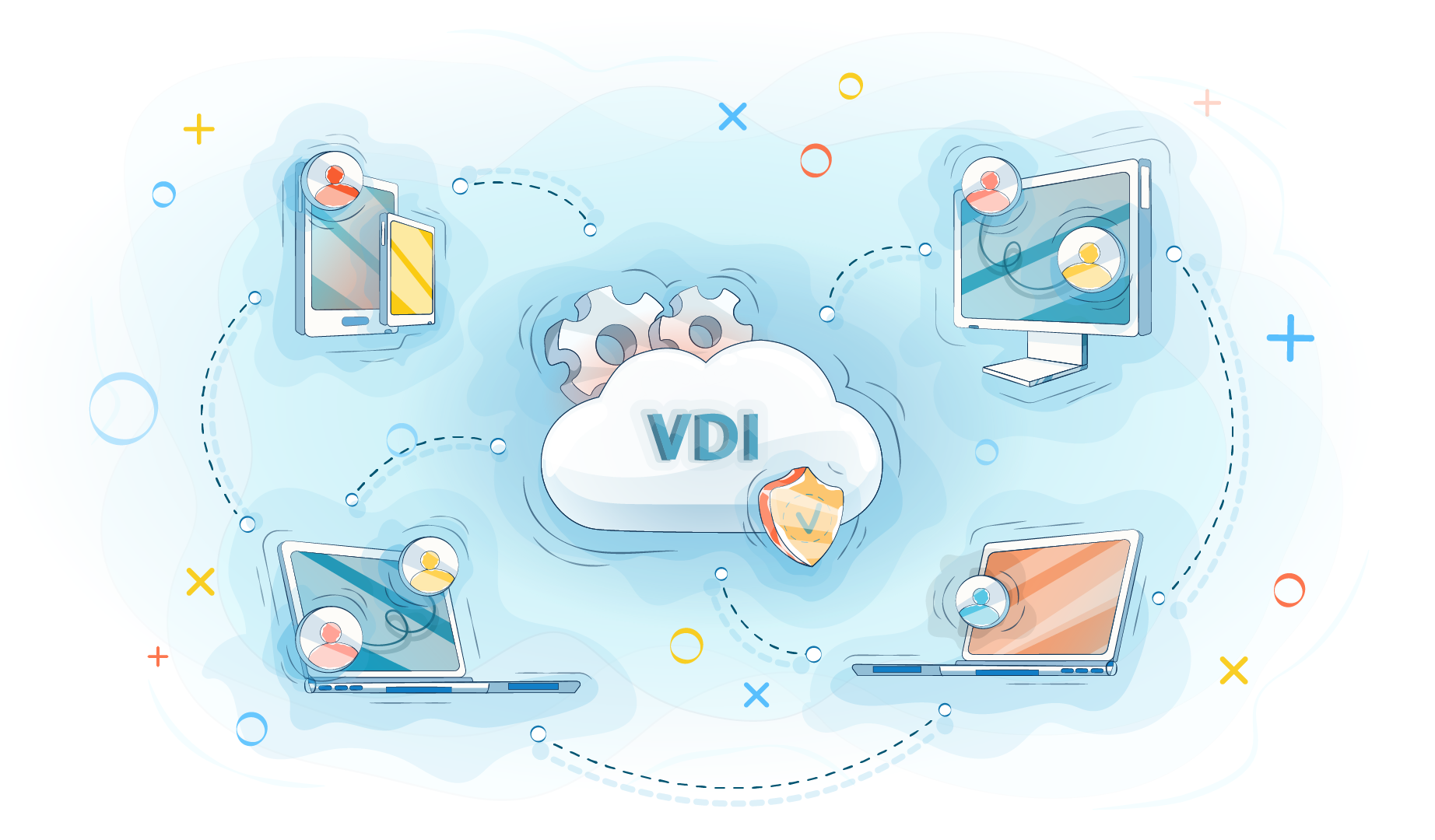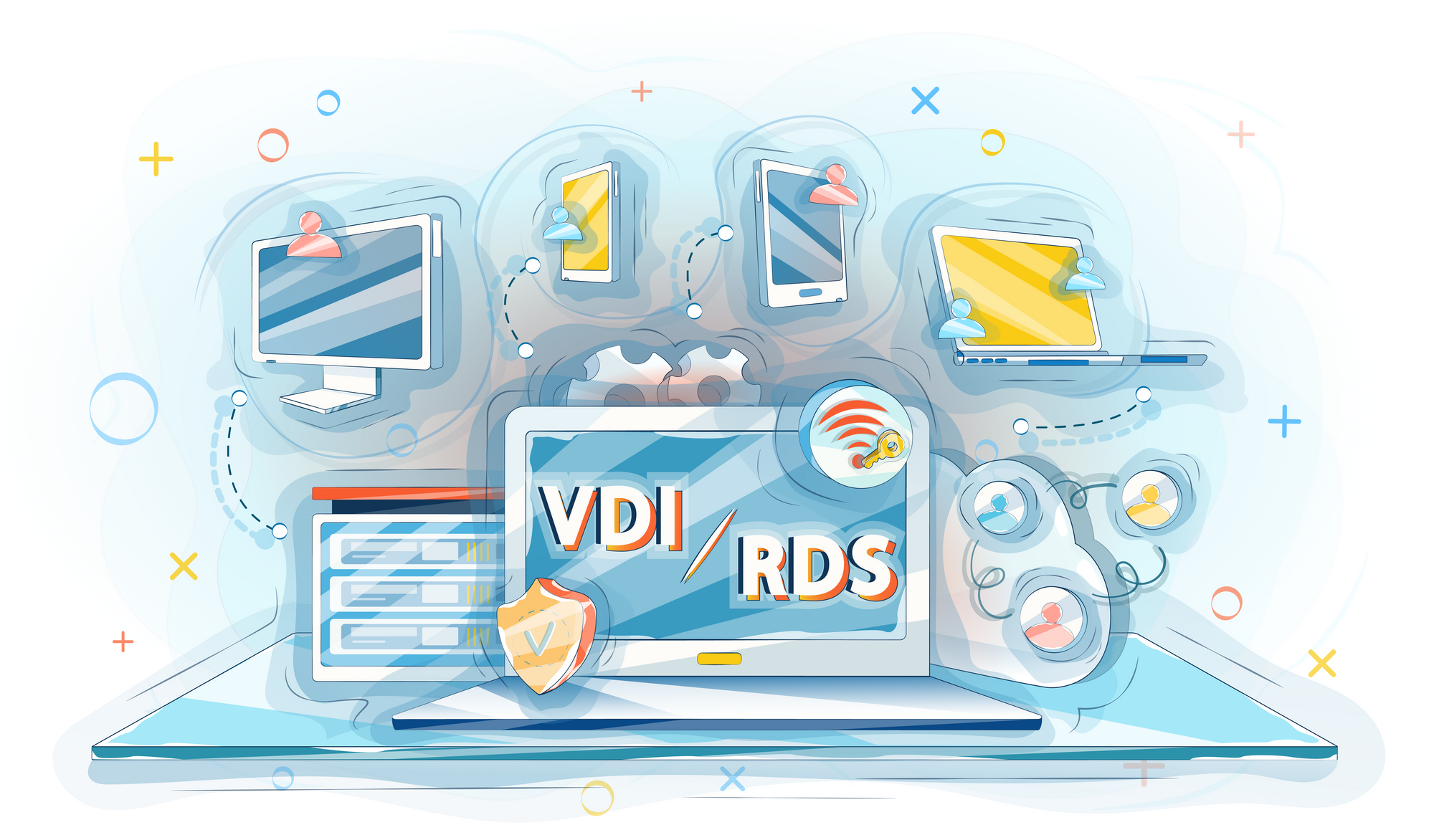The effectiveness of all business processes is a key factor that has a direct impact on the company's income and development. One of the most effective solutions can be the transition to remote workstations. Imagine a company with a big number of employees. It is necessary to configure each employee`s computers, to install the software. Over time, there is a need to upgrade the PC, to update the software, and its further maintenance. This is a rather time-consuming process, which requires a significant expenditure of resources. With the introduction of VDI, such problems will be minimized or eliminated completely.
What is VDI?
The concept of VDI (Virtual Desktop Infrastructure) denotes a virtual desktop infrastructure. This is a technology used to create a virtualized environment on a remote server. The image is delivered via the network to the endpoint device, thus allowing the user to interact with the operating system and its applications as if he/she were working locally. The endpoint can be a desktop computer, a laptop, a thin client, or a mobile device.
The essence of this technology is the division of a physical or virtual server into a set number of virtual desktops. Users get remote access to them through their devices.
The pros of using VDI for virtualization of the workstations
Many companies have already implemented this technology and managed to note its advantages. For those who are just thinking about moving to virtual workstations, below are their main advantages. There are indeed a lot of advantages: from the possibility of secure remote access to reducing costs. Virtualization is unlikely to become a universal "pill" of any problematic situations, but it will still help to solve some issues.
Remote access
This is the main distinctive feature of VDI. Users have an opportunity to connect to the workstation via the Internet. It does not matter when and where an employee logs on to the system. Thus, virtualization of workstations significantly helps to organize remote work.
In addition to the fact that the company itself does not need to spend resources configuring office PCs, the employees themselves feel the usefulness of virtualized workstations. This is an advantageous option for employees who travel on business trips or often have to work from home.
Mobility
From the previous paragraph, the next one logically follows. When using a virtual workstation, the user is not bound to a specific device. To log on from another computer or even a mobile gadget, simply log on to the system. Even if the user loses or breaks the device, there will be no problems with access to the necessary data.
For example, let us take a big corporation with lots of departments. A specialist in the company is obliged to visit different points of the network, but he/she needs certain highly specialized applications for work. It is not advisable to install them on different devices because data security could be negatively affected. Software licensing requirements can also complicate the task. In this case, the virtualization of the workstation will simplify the task and make the work more efficient.
Data security
Another important aspect of VDI is security. Usually, all necessary applications and data are stored on local hardware, such as laptops or desktop computers. If the device is stolen or damaged, the data are lost, often irrecoverably. After VDI technology is implemented, all data will be stored on a central server, so no files will be lost if a system failure occurs.
Moving to virtual workstations also helps keep your information confidential. It is impossible to copy data to external media from the server because the administrator can limit such actions. They will not be transferred to unauthorized persons, thus guaranteeing a high level of corporate security.
Easy configuration
When using local workstations, it becomes costly to install applications on each PC. With VDI, there is no need to configure each system manually. The preparation of virtualized desktops takes place on the server. This simplifies the task, saves the employees` time, and reduces the labor intensity of the work.
It also simplifies the upgrade process as there is no need to perform manipulations on all devices. In the case of remote desktops, the required software is updated centrally. The only necessary action for users will be the correct connection.
Location in a data center
High data center performance allows you to use all its advantages. Location in a specialized data center provides enhanced security, high reliability, high-end infrastructure, and fast disaster recovery.
Minimum requirements
High hardware performance is a factor that becomes secondary after the introduction of remote desktops. The employees` PCs, from which they connect, must receive, send data, and download images.
There are no more specific requirements for the devices. Users can access the necessary programs, files, data from any device, and even use outdated hardware in the office. A thin client, a mobile phone, or a tablet can also be used for the connection.
Cost reduction
Perhaps the most significant advantage of remote workstations is their low cost. Moving to this technology can indeed be costly, especially for small companies. However, it is not necessary to:
- buy expensive and high-performance hardware;
- spend big sums on licensed software for different devices.
Taking into account these two factors, the cost will indeed be lower. Especially, this fact will be appreciated by companies, whose offices have tens or even hundreds of individual computers.
Besides, it is necessary to note a considerable economy when scaling. When the company develops and hires new specialists, it will be enough to install a device with standard performance to organize their work.
The specified positive sides are confirmed by the marketing research of the company Allied Market Research. The statistics shows that the market volume in VDI, according to the data of 2016, was 3.654 million dollars. Experts predict a 16.5% growth of the indicator by 2023 (up to $10.154 million).
Are there any disadvantages to the virtualization of the workstations with the help of VDI technology?
The only disadvantage of this technology is the need for constant access to the Internet. But this disadvantage in modern conditions cannot be called significant, taking into account numerous advantages of this technology.
Counting the cost of moving to virtual workstations, it is safe to say that only small companies will bear losses. If it is a small business or a start-up, it is better to delay the use of such technologies till the transition to a higher level. But for big corporations, corporate networks, and developed enterprises, implementation of such an approach is more likely to be beneficial.
Which companies will benefit from the use of VDI?
The virtualization of workstations with the help of this technology is most often used by big companies with extended infrastructure. If the enterprise belongs to a small business segment, is just getting started, or has no administrative difficulties, VDI implementation is not necessary. In this case, the work through terminal access will be effective as well. For big companies that have a large staff and numerous branches, virtualization will help eliminate all possible risks and reduce equipment costs.
Sometimes the necessity to move to virtualized desktops is influenced by the field of activity of the enterprise. It is difficult to identify the particular business specifics in which the implementation of VDI will make the work more efficient - it is a good option for various industries. If a company operates with a big data set, and the key factor in the activity is their safety, mobility, and stabilization of all processes, then the use of this technology can directly improve the quality of work.
A clear example of a successful transition to desktop virtualization using VDI can be big call centers where a lot of information needs to be protected. Also, such a technology will be an effective measure in the banking sector and medical institutions, as companies from these industries actively care about the safety of many clients' data.
Have you evaluated the advantages of the technology of VDI and are you going to implement this solution into the work of your company? King Servers, on its part, will do everything possible to effectively move your business to a new level. We have our own network of servers in data centers of Russia, the Netherlands, and the USA. We offer:
- flexible pricing policy;
- 24-hour technical support;
- server monitoring 24/7;
- 100% uptime.
The team of King Servers always makes maximum efforts to ensure that customers are satisfied with the services. Just contact us to start cooperation and see all the advantages of VDI technology from your own experience.
























